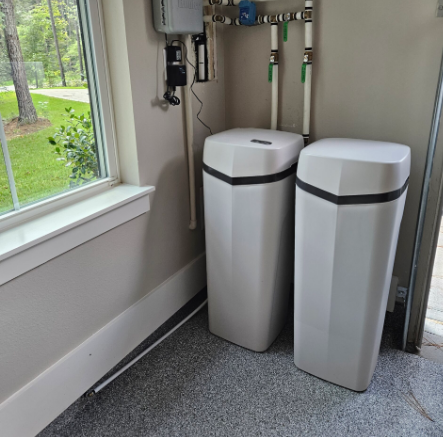Ensuring Quality Water: Choosing the Right Water Softener for City Water in Texas

Living in Texas comes with many perks, but one challenge many residents face is the hardness of the water. Even in urban areas where city water systems provide treated water, the levels of minerals, particularly calcium and magnesium, can be quite high. These minerals are what make water “hard,” and they can lead to a range of issues from limescale buildup in plumbing to dry skin and dull laundry. A water softener can be a game-changer for households relying on city water. In this blog, we’ll explore the necessity of Texas water softener for city water, how they work, and how to choose the right one for your needs.
Understanding Water Hardness
Water hardness is determined by the concentration of calcium and magnesium ions in the water. The United States Geological Survey (USGS) classifies water hardness as follows:
- Soft: 0-60 mg/L (milligrams per liter)
- Moderately hard: 61-120 mg/L
- Hard: 121-180 mg/L
- Very hard: >180 mg/L
In many parts of Texas, water hardness can exceed 180 mg/L, making it “very hard.” This hardness is not only a nuisance but can also damage appliances, reduce the efficiency of heating systems, and increase the need for cleaning products.
The Impact of Hard Water
Hard water impacts both your home and health in various ways:
- Plumbing Issues: Over time, hard water causes limescale deposits inside pipes, reducing water flow and leading to potential clogs and corrosion.
- Appliance Lifespan: Appliances like dishwashers, washing machines, and water heaters suffer from scale buildup, which can shorten their lifespan and increase energy consumption.
- Laundry Problems: Clothes washed in hard water often feel harsh and may fade more quickly.
- Skin and Hair: Hard water can leave your skin feeling dry and your hair looking dull and lifeless.
- Cleaning Challenges: Hard water reacts with soap to form a scum that is difficult to rinse away, making cleaning tasks more labor-intensive.
How Water Softeners Work
Water softeners mitigate the problems caused by hard water through a process known as ion exchange. Here’s how it works:
- Ion Exchange: Hard water passes through a resin bed within the softener. The resin beads are coated with sodium or potassium ions. As the hard water flows through, the calcium and magnesium ions are attracted to the resin beads and are exchanged for sodium or potassium ions.
- Regeneration Cycle: Over time, the resin becomes saturated with calcium and magnesium. The water softener then goes through a regeneration cycle where a brine solution flushes the resin bed, recharging it with sodium or potassium ions and washing the accumulated hardness minerals down the drain.
Choosing the Right Water Softener
When selecting a water softener for city water in Texas, consider the following factors:
- Water Hardness Level: Test your water to determine its hardness level. You can use home test kits or get a water quality report from your local water utility.
- Household Water Usage: Consider the number of people in your household and your daily water usage. This will help you determine the capacity of the water softener you need.
- Type of Water Softener:
- Salt-Based Ion Exchange Softeners: These are the most common and effective for dealing with high levels of hardness. They require regular maintenance, including replenishing the salt.
- Salt-Free Water Conditioners: These don’t actually soften water but condition it to prevent scale buildup. They are a good option for those concerned about sodium intake or environmental impact.
- Dual-Tank Softeners: Ideal for large households or high water usage, these systems have two tanks to ensure a continuous supply of soft water during regeneration cycles.
- Regeneration Method: There are time-based (regenerates at set times) and demand-initiated (regenerates based on actual water usage) systems. Demand-initiated systems are more efficient and can save on water and salt.
- Certifications and Warranties: Look for water softeners certified by NSF/ANSI standards, and check the warranty terms for parts and labor.
Installation and Maintenance
Proper installation and regular maintenance are crucial for the efficient operation of your water softener. Here’s what you need to know:
- Professional Installation: Although some DIY enthusiasts may prefer to install their water softeners, professional installation ensures correct setup and adherence to local plumbing codes. It also often includes a warranty.
- Regular Maintenance: Regularly check salt levels and replenish as needed. Clean the brine tank periodically to prevent salt bridges and other blockages.
Annual service by a professional can help maintain the system’s efficiency. - Monitor Water Quality: Even with a water softener, it’s good practice to periodically test your water quality to ensure the system is functioning correctly and to check for any other potential contaminants.
Additional Water Treatment Options
While water softeners address the issue of hardness, other filtration systems can improve overall water quality:
- Activated Carbon Filters: These can remove chlorine, organic compounds, and certain pesticides, improving taste and odor.
- Reverse Osmosis Systems: Ideal for removing a wide range of contaminants, including lead, arsenic, and nitrates, providing an extra layer of protection for your drinking water.
- Whole-House Filtration Systems: These systems can be combined with water softeners to address multiple water quality issues simultaneously.
Conclusion
Investing in a water softener is a wise decision for Texas residents dealing with hard city water. It not only protects your home and appliances but also enhances your quality of life by providing cleaner, softer water. When choosing a water softener, consider the hardness level of your water, your household’s water usage, and the type of system that best meets your needs. Proper installation and maintenance will ensure your system functions efficiently for years to come. Additionally, consider complementary filtering city water Texas systems to address other water quality concerns. With the right water treatment solutions, you can enjoy the benefits of soft, clean water throughout your home.







